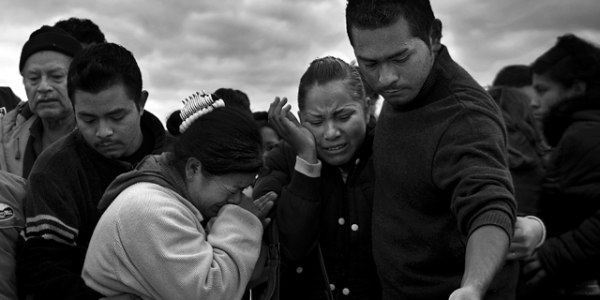Mexican drug cartels are shipping more than massive quantities of drugs north of the border. Increasingly, they're also exporting bloody mayhem.
Seeking to stem the growing influence of the Sinaloa cartel within the United States, federal agents arrested more than 50 suspects in raids Tuesday night and Wednesday morning at different ends of the country. The raids capped a 21-month operation by the Drug Enforcement Administration that rounded up 755 suspects and seized more than $59 million in criminal proceeds.
"These cartels will be destroyed," Attorney General Eric Holder said Wednesday at a press conference announcing the arrests.
The overnight roundup by DEA and state and local police included arrests in California, Minnesota and the Maryland suburbs of Washington.
Holder called the cartels a threat to national security, adding, "They are lucrative, they are violent, and they are operated with stunning planning and precision."
Use of U.S. assault weapons
The attorney general also suggested that re-instituting a U.S. ban on the sale of assault weapons would help reduce the bloodshed in Mexico, where last year 6,000 people were killed in drug-related violence.
Increasingly, U.S. law enforcement officials see cartel violence spill into the United States, often as far away as Phoenix and Atlanta.
As he discussed the problem, Holder spoke briefly in Spanish, pledging continued cooperation with Mexican authorities who have increasingly come under direct fire from the heavily armed drug gangs.
U.S. officials have a responsibility to make sure Mexican police "are not fighting substantial numbers of weapons, or fighting against AK-47s or other similar kinds of weapons that have been flowing to Mexico," Holder said.
DEA Acting Administrator Michele Leonhart said the raid showed the tentacles of the crime syndicate had spread far across the United States — not just to major cities like Washington and Los Angeles, but to quiet, smaller communities like Stowe, Iowa, which the cartel allegedly used as a conduit to funnel drugs around the country.
Sinaloa 'hit hard' but hugely powerful
Leonhart said the Sinaloa cartel has become one of the largest organized crime operations in the world.
Slideshow 15 photos
Mexico Under Siege
"They've been hit hard, and their ability to spread death and destruction has been diminished" by the arrests, Leonhart said.
Last year, a sweeping corruption probe led to the arrest of a dozen high-ranking Mexican officials accused of collaborating with the Sinaloa group or its one-time ally, the Beltran Leyva gang. Those arrested include former drug czar Noe Ramirez, who is accused of taking $450,000 from Sinaloa.
The U.S. government has praised President Felipe Calderon's government for rooting out corruption at the top.
Yet over the many months the DEA's investigation proceeded, cartel violence on both sides of the border increased substantially.
Spring Break advisory
The State Department issued a travel warning Friday, urging U.S. citizens traveling to Mexico to be aware of the increased threat of violence and kidnapping, especially along the border. The situation in Ciudad Juarez, which lies across the border from El Paso, is of special concern, the State Department cautioned.
It also issued an advisory on Spring Break in Mexico, where more than 100,000 U.S. citizens visit each year. The department warns of the increased violence along the border and advises revelers in Matamoros and Nuevo Progresso, popular destinations for spring breakers on South Padre Island, Texas, to "exercise common-sense precautions such as visiting only the well-traveled business and tourism areas of border towns during daylight and early-evening hours."
More on: Sinaloa
